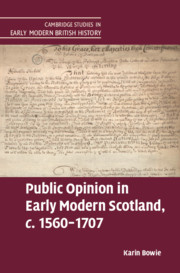Book contents
- Public Opinion in Early Modern Scotland, c.1560–1707
- Cambridge Studies in Early Modern British History
- Public Opinion in Early Modern Scotland, c.1560–1707
- Copyright page
- Contents
- Acknowledgements
- Abbreviations
- Introduction
- Chapter 1 Protestations
- Chapter 2 Petitions
- Chapter 3 Oaths
- Chapter 4 Public Communications
- Chapter 5 The Inclinations of the People
- Chapter 6 The Sense of the Nation
- Conclusions
- Bibliography
- Index
Chapter 3 - Oaths
Published online by Cambridge University Press: 21 December 2020
- Public Opinion in Early Modern Scotland, c.1560–1707
- Cambridge Studies in Early Modern British History
- Public Opinion in Early Modern Scotland, c.1560–1707
- Copyright page
- Contents
- Acknowledgements
- Abbreviations
- Introduction
- Chapter 1 Protestations
- Chapter 2 Petitions
- Chapter 3 Oaths
- Chapter 4 Public Communications
- Chapter 5 The Inclinations of the People
- Chapter 6 The Sense of the Nation
- Conclusions
- Bibliography
- Index
Summary
Oaths were ubiquitous in late medieval society, binding men to political structures and leaders. With the Reformation in Scotland, oaths became an important tool of indoctrination and engagement, used by early reformers and later dissidents to bind the consciences of male and female followers and by the crown to weed dangerous opinions out of government and wider society. From 1581, reformers linked assertory confessional oaths, traditional Scottish bands promising mutual aid and the Old Testament trope of the covenanted nation to create powerful collective oaths taken by men and women in parishes across Scotland. The swearing of the King’s Confession, the National Covenant and the Solemn League and Covenant allowed the nation’s commitments to be invoked to justify political demands, even when actual opinions were divided. This chapter examines the development of collective oaths from the reign of James VI, tracing an unfolding battle to control the opinions of subjects at large, including, under James VII, a brief experiment in the lifting of all oaths except civil allegiance.
Keywords
- Type
- Chapter
- Information
- Public Opinion in Early Modern Scotland, c.1560–1707 , pp. 89 - 136Publisher: Cambridge University PressPrint publication year: 2020

